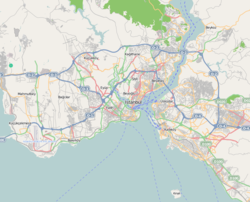Karacaahmet Cemetery
show This article may be expanded with text translated from the corresponding article in Turkish. (November 2020) Click [show] for important translation instructions. |
 Old gravestones in Karacaahmet Cemetery | |
 Karacaahmet Cemetery | |
| Details | |
|---|---|
| Established | Mid-14th century |
| Location | |
| Country | Turkey |
| Coordinates | 41°00′40″N 29°01′34″E / 41.01111°N 29.02611°ECoordinates: 41°00′40″N 29°01′34″E / 41.01111°N 29.02611°E |
| Type | Public |
| Owned by | Istanbul Metropolitan Municipality |
| Size | 750 acres (3.0 km2) |
| No. of interments | over 1 million |
| Website | İBB Mezarlıklar Md. website |
The Karacaahmet Cemetery (Turkish: Karacaahmet Mezarlığı) is a 700-year-old historic cemetery, located in Üsküdar, the Asian side of Istanbul. Karacaahmet cemetery is the oldest in Istanbul and at 750 acres (3.0 km2), the largest burial ground in Turkey.
The cemetery was named after a warrior companion of Orhan I, the second Ottoman sultan and is believed to have been founded in the mid-14th century. It is estimated that over a million people are interred in the non-profit cemetery.[1]
Karacaahmet Cemetery comprises 12 parcels, each dedicated to different religious groups. Many historical headstones can still be seen with inscriptions written in the Ottoman Turkish alphabet, a version of the Arabic alphabet. The burial ground is covered by high cypress trees.[2]
The shrine of , a 13th-century physician and saint of Bektashis, a tariqah of Islam, is situated within the cemetery.[3] There are also many other historical tombs and masjids, which is the Arabic word for mosques, built during the Ottoman period.
The excavation works in the tunnel for the Marmaray project caused little damage as by June 2007, a dent of 1.5 m diameter and 4 m depth occurred close to the cemetery wall. It was reported that some graves were damaged.[4]
Notable burials[]
List in sorted order of the year of death.
- Historical
- Sheikh Hamdullah (1436–1520), calligrapher
- Benderli Ali Pasha (? - 1821), Sultan Mahmud II's Grand Vizier
- (1788-1869),[5] a Naqshbandi tariqa shaykh and relative of Imam Shamil
- Mehmed Rauf Pasha bin Abdi Pasha (1832 - 1908), Ottoman Serasker and Vali
- 1940s
- Kaçı Vehip Pasha (1877–1940), Ottoman general
- Ali bey Huseynzade[6] (1864–1940), Azerbaijani writer, thinker, philosopher, artist and doctor, and was the creator of the modern Flag of Azerbaijan.[7]
- 1950s
- Reşat Nuri Güntekin (1889–1956), novelist
- Cafer Tayyar Eğilmez (1877–1958), an officer of the Ottoman Army and a general of the Turkish Army
- Osman Zeki Üngör (1880–1958), composer, initial conductor of the Presidential Symphony Orchestra, general
- Süleyman Hilmi Tunahan an influential Islamic scholar and Naqshbandi master, whose supposed followers are referred to as Süleymancılar
- 1960s
- Safiye Erol (1902–1964), female novelist
- Fikret Mualla Saygı (1903–1967), painter
- 1970s
- Nejdet Sançar (1910–1975), nationalist writer and ideologue
- Nihal Atsız (1905–1975), nationalist writer, ideologue, novelist, poet and philosopher
- 1980s
- Burhan Felek (1889–1982), journalist
- Oktay Rifat Horozcu (1914–1988), poet
- Ömer Boncuk (1917–1988), footballer and high school teacher
- 1990s
- Hamiyet Yüceses (1915–1996), female singer of Ottoman classical music
- 2000s
- Cem Karaca (1945–2004), rock musician
- Nezihe Viranyalı (1925–2004), female aviator
- Arif Mardin (1932–2006), Turkish-American music producer
- Nükhet Ruacan (1951–2007) female jazz singer [8]
- Mustafa Şekip Birgöl (1903–2008), retired colonel and the last veteran of the Turkish War of Independence
- Saadet İkesus Altan (1916–2007), female opera singer, vocal coach and opera director,[9]
- Fazıl Hüsnü Dağlarca (1914–2008), poet
- Gazanfer Özcan(1931–2009), actor
- 2010s
- Verda Ün (1919–2011), female classical pianist
- Esin Afşar (1936–2011), singer and stage actress
- Sait Maden (1931–2013), translator, poet, painter and graphic designer
- Oktay Sinanoğlu (1935–2015), theoretical chemist[10]
- Tahsin Şahinkaya (1925–2015), Air Force general and one of the five leaders of the 1980 military coup
- Halit Akçatepe (1939-2017), actor[11]
- İbrahim Erkal (1966–2017), singer and songwriter[12]
- Can Bartu (1936–2019), basketball player, footballer and columnist,[13]
- Süleyman Turan (1936–2019), stage and film acor,[14]
- Yaşar Büyükanıt (1940–2019), former Chief General Staff of the Turkish Armed Forces,[15]
See also[]
References[]
- ^ "Time Out Istanbul". Time Out. Retrieved 2007-09-02.
- ^ Municipality of Üsküdar Archived 2007-12-11 at the Wayback Machine (in Turkish)
- ^ European Alevi Unions Confederation official website (in Turkish)
- ^ Istanbul News (in Turkish)
- ^ Fatma Mehlika Mısıroğlu, Semâmızda Bir Yıldız, Sebil Yayınevi, İstanbul, 2011
- ^ Program kapsamında, anma toplantısı öncesinde Ali Bey Hüseyinzade’nin Üsküdardaki Karacaahmet Mezarlığındaki kabri ziyaret edildi. Archived 2014-05-21 at the Wayback Machine
- ^ Whitney Smith. Flag Lore Of All Nations. — Millbrook Press, 2001. — P. 13. — ISBN 9780761317531
- ^ "Nükhet Ruacan öldü". Habertürk (in Turkish). 2007-05-07. Retrieved 2017-11-18.
- ^ "Hocaların hocası Saadet İkesus Altan öldü". Milliyet (in Turkish). 16 December 2007. Retrieved 21 October 2020.
- ^ Türk, Ümit (2015-04-26). "Oktay Sinanoğlu son yolculuğuna uğurlandı". Hürriyet (in Turkish). Retrieved 2015-04-26.
- ^ "Halit Akçatepe, Şakirin Camii'nden son yolculuğuna uğurlandı". www.ntv.com.tr (in Turkish). Retrieved 2021-07-29.
- ^ "Binlerce Kişi İbrahim Erkal'ı Son Yolculuğuna Uğurladı". Milliyet. 13 May 2017. Retrieved 13 May 2017.
- ^ "Turkish football legend 'Sinyor' Can Bartu dies at 83". Hürriyet Daily News. 12 April 2019. Retrieved 16 April 2019.
- ^ "Yeşilçam'ın usta oyuncusu Süleyman Turan son yolculuğuna uğurlandı". Sabah (in Turkish). 11 September 2019. Retrieved 14 September 2019.
- ^ "Yaşar Büyükanıt son yolculuğuna uğurlandı". Sözcü (in Turkish). 23 November 2019. Retrieved 23 November 2019.
- Cemeteries in Istanbul
- Sunni cemeteries
- Shia cemeteries
- Üsküdar
- Muslim cemeteries

